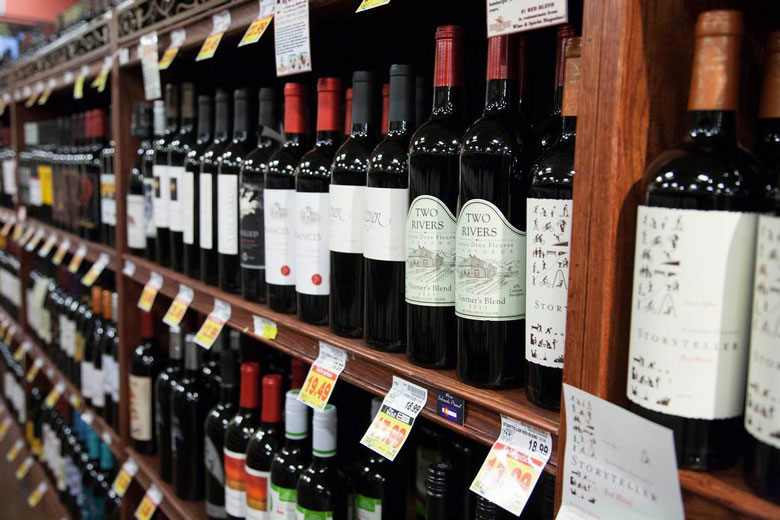Feature Article from the June 2016 Magazine Issue
Colorado Gets Liberal with Liquor Law
State lawmakers agree to phase in retail sales of wine, beer and spirits
by Jane Firstenfeld

Grocery store chains in Colorado will be allowed up to 20 liquor licenses in the next 20 years, according to legislation recently signed by the governor. Photo: Your Choice Colorado
Denver, Colo.—With legal marijuana sales and a burgeoning wine industry, U.S. residents who don’t live in Colorado may not have realized how restricted retail alcohol sales have been. While not exactly a “control state,” Colorado has limited most alcohol sales to liquor stores and a virtual handful of retail outlets.
Colorado’s SB 197 originated in the state senate, made its way relatively rapidly through the legislature and was signed into law by Gov. John Hickenlooper last week. After it takes effect in January 2017, the “compromise liquor law” will phase in over the course of 20 years, allowing licensed grocery and drug stores to obtain liquor licenses for multiple locations and giving existing liquor stores an opportunity to adjust to the changing market.
Current law permits grocery and drug store chains a single liquor license for the entire state. That means that in all of Colorado, only one Walmart, Safeway, Rite Aid or Target location was permitted to sell alcoholic beverages.
Courtney Lis of Voca PR, which handles public relations for the Colorado Wine Industry Development Board, told Wines & Vines, “I live in Denver; there’s a Target in a suburb that sells wine and beer.” Lis said the new regulations “will not be like California, where wine’s available at every corner store, but it’s a good compromise—a middle ground that’s fair to all the players.”
Colorado currently has 115 wineries according to Wines Vines Analytics. “It’s growing, and we’re trying to get people to try our local wines,” Lis said. Wines from other regions may also enjoy the wider distribution.
The compromise was supported by the Distilled Spirits Council (DISCUS). Its media rep Eric Reller told Wines & Vines that the application process for additional licenses will be similar to current procedures. “It’s a good compromise that has been in the works for a long time,” he said.
Prior to the new legislation, Walmart, Safeway and King Soopers (a grocery chain operated by parent company Kroger) had chipped in about $8 million each to put a measure on the ballot to expand sales. With SB 197 now signed into law, CLBA said, the ballot measure will be withdrawn.
The Colorado Licensed Beverage Board website includes a clear narrative tracking the new law. Provisions include limitations on location for new retail licenses based on proximity of existing businesses and nearby populations.
According to the board’s description of the new law, a grocery store chain will be allowed 20 maximum liquor licenses in the next 20 years, compared to just one as allowed by current law. If there are any existing liquor stores nearby (within 1,500 feet) of a grocery store that the chain wants to sell liquor from, the company will have to buy those stores out before securing a license for its store. If there aren’t any liquor stores the grocery store must still purchase two retail liquor licenses within the local jurisdiction
With the number of licenses slowly phasing in until 2037, the new law “gives 20 years for the marketplace to adjust and for retailers to recoup investments.”
In addition, all stores need to be reviewed and approved by local officials; cannot allow self-checkout for alcohol sales; must designate a local alcohol purchase manager to purchase locally produced products.
The new license holders will be prohibited from selling alcohol below cost and cannot bulk purchase across multiple stores. (Each store must buy individually from a wholesaler.) Stores also are forbidden from storing alcohol off the licensed premises.
Wholesalers and employees also are protected: A single wholesaler must sell to each licensee; a single manager must handle all alcohol purchases, and employees under 21 cannot touch or sell alcohol.
Read the entire narrative here.
Association reaction
In exchange for passing SB 16-197, liquor retailers (CLBA and Coloradans for Safety), Walmart, Target, Colorado Convenience Store Association and the Distilled Spirits Council of the United States agreed to remove current 2016 ballot measures and oppose other 2016 liquor-related ballot measures.
Stephanie Fransen, lobbyist for the Colorado Association for Viticulture and Enology (CAVE), said that CAVE was instrumental in the new legislation. “The craft wine industry was in on the process early on. The gradual phase-in was designed not to change wine marketing overnight. We haven’t always been a liberal state, but we have plenty of happy wine drinkers.
She called the new law “absolutely groundbreaking. It took a decade to make the compromise: They needed to hash this out, and there are a lot of protections in place.”

415.453.9700 | Fax: 415.453.2517
info@winesandvines.com


